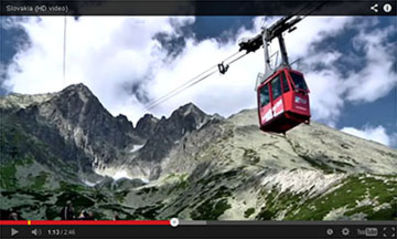Bread and butter for people of
Ružindol were depending on the farming and vinicultural productivity. Local residents were always reacting very emotionally to fluctuations of wine grape crop or grape wine parasites and the blame was usually attributed to witches. History records tell us that four women were accused of witchery.
In the past, women dedicated to magic were rather respected natural healers than witches on brooms, but nevertheless they were paying for their magical skills or knowledge, because they were ahead of their times. Up to four of them made their mark into history of Trnava which says about their cruel fate.
The most known case was the case of Katarína Šnajderová from 1684 when she was questioned by the court of
Trnava. She was accused of witchy things, causing problems with cows, fields, gardens and vineyards. The disputes with local witches didn't finish with this case. Two other accused women in 1744 were Magdaléna called Abdonička and Anna Chlebová called Jamborka. The whole village was afraid of them and they considered them to be able to cause an illness or even death at anyone. For the supposed witches the trial finished in a very unfavourable way. Although many testimonies contradicted and were not clear, the "careful and clever" municipal council of Trnava sentenced them and they both were beheaded and burned.
People of
Ružindol have been known as "wizards" almost for 300 years thanks to the trials with witches. These women really pursued healing of people and farm animals. Thanks to their knowledge and experience they were ahead of their time so nobody was tolerant of them. The healer regarded to themselves as witches first when they were at their wits' end because of a high stage of an illness.
The event takes you
back to the Middle Ages and you find out why the witches were accused, how the trials were going on and what the witches' revenge was like. The plot line will take place in the centre of the municipality and will contine also in the winery Rosenthal. In the winery, you can taste great wine and delicious traditional specialities made throughout the whole day. The highlight is at twilight in the village square.
During
this event, there is a whole day
additional programme prepared for the visitors in a form of various interactive activities. Children can take part at the witchery workshops practising what every wizzard should know. There is also a period fair waiting for curious visitors and a medieval band would care for a musical experience.
Disputes with "witches" have been known since 1599. These were mostly argues and accusations of each other because of crop failure causing, theft of cellar grapes or spoiling of ready wine. The most known case was the case of Katarína Šnajderová from 1684 when she was questioned by the court of Trnava. She was accused of witchy things, causing problems with cows, fields, gardens and vineyards. The blame was laid on her because of intentional damaging to health of several people and because of intercourse with Satan. Nowadays we know that Katarína was interested in phytotherapy, but she couldn't heal some of the serious illnesses. Although her effort she could hardly wait thankfulness. A few days later, the next woman - Zuzana Čarpusová - was accused. They both undertook the water test, so called "Trial of God". This proved that they are guilty and so they were burned to death at the stake,al though none of them didn't plead guilty. Mayor's book documents also the case from 1744, when two women of Ružindol, Magdaléna called Abdonička and Anna Chlebová called Jamborka were accused and they allegedly had been meeting behind the village in the vineyards with intent to harm their neighbours. People were afraid of them and they considered them to be able to cause an illness or even death at anyone. Although many testimonies contradicted and were not clear, the "careful and clever" municipal council of Trnava sentenced them and they both were beheaded and burned. People of Trnava and Ružindol, and compulsory also two senators representing the municipal council, vicenotary and deputy of the main operator, they all were at the execution.
This event is financially supported by Ministry of Transport and Construction of the Slovak Republic
The event is supported by National Tourism Portal slovakia.travel as a main partner





















